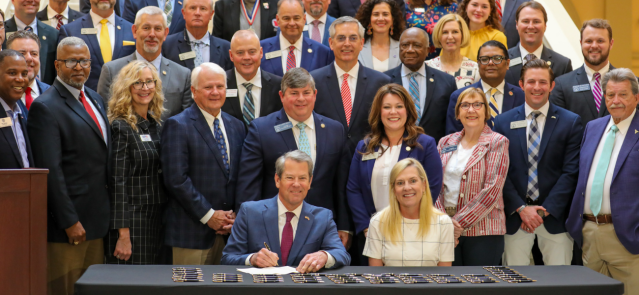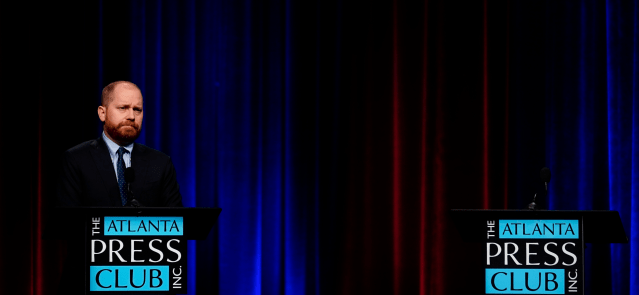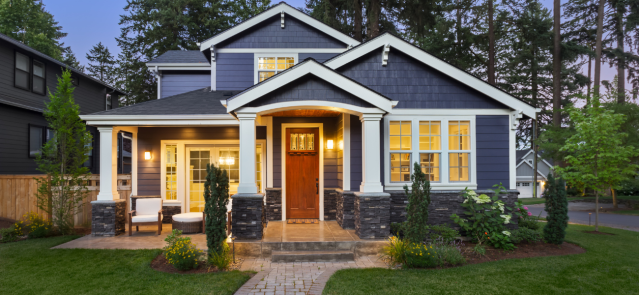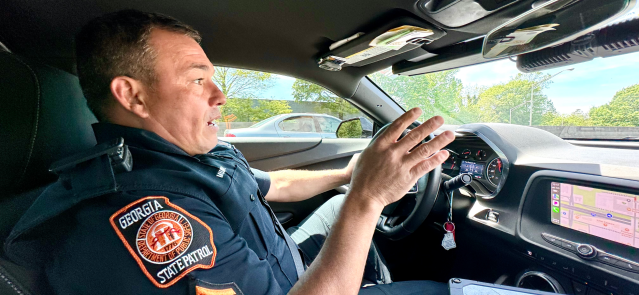Stay ahead of the curve as a political insider with deep policy analysis, daily briefings and policy-shaping tools.
Request a Demo‘In God’s hands’: Georgia renters outside Atlanta, Savannah wait months for help
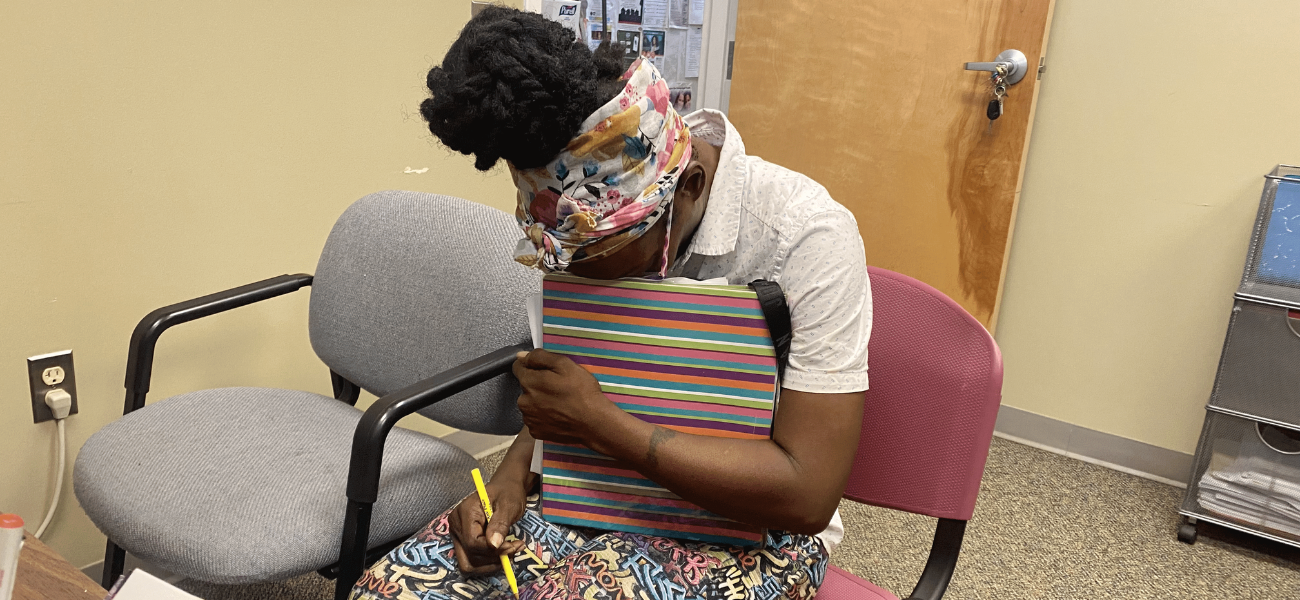
Credit: Beau Evans (State Affairs)
VALDOSTA, Ga. — The living room of the two-bedroom house where Barbara Brown lives on Cummings Street, a poor spread of homes streaked in Spanish moss on the south side of Valdosta, has little furniture except a sofa in the corner, and an air mattress on the floor.
Brown lives with her niece, Alexis Burkes, a 34-year-old woman with schizophrenia and bipolar disorder who has a habit of leaving the house to wander the streets alone. Usually, the neighbors alert Brown before Burkes gets too far away.
Those neighbors and the house might not be theirs soon. In and out of work the past year during the COVID-19 pandemic, and now $3,600 behind on rent, Brown and her niece are being evicted. Their move-out day is July 1.
“We don’t know where we’ll go,” said Brown, 58, an in-home elderly caregiver who contracted COVID-19 about a year ago. “I’m so tired.”

Brown is one of thousands of Georgians who have tried and failed to benefit from a pandemic-era relief program with around $800 million in federal funds meant to help low-income residents pay rent. Roughly 15 months into the program, Georgia has given out just 30% of that money to struggling tenants, placing the state among the slowest in the country to distribute rental assistance.
Many people applying for rent relief have waited months to find out whether their applications will be approved – only to be denied. Sometimes, renters don’t hear anything back from state Department of Community Affairs (DCA) staff charged with processing applications. That’s been the case for Brown, who applied for rental assistance in early March.
“They spent millions hiring processors, and still no one has taken this woman’s case,” said the Rev. Ronnie Mathis, pastor at Crossing Jordan Baptist Church who runs the South Georgia Partnership to End Homelessness in Valdosta. He and his volunteer staff routinely help people fill out rental-assistance applications. Rarely ever does the process go smoothly, he says.
“This stuff will tear you to pieces,” Mathis said on a recent morning spent helping clients track the status of their applications. “You hear it every day, and it makes you mad.”

The state has picked up the pace since December when only 10% of its rental assistance dollars was handed out and the state faced a real risk of having the federal government claw back funds. The pace was so worrisome that DCA officials sent $240 million of its federal funding share to local governments in the Atlanta, Savannah and Augusta metro areas, which separately have pushed out rental assistance dollars to their residents much faster than the state.
But as millions pour into the state’s urban centers, tenants and housing advocates in more rural and less-populated areas – such as Valdosta, Macon and Brunswick – are feeling left behind.
“People in metro Atlanta have kind of just figured it out, but it’s worse in other places,” said Bambie Hayes-Brown, president and chief executive of the housing advocacy group Georgia Advancing Communities Together. “These types of stories kind of fly under the radar because it’s not Atlanta or the metro area. But these are the things that are going on across the state.”
DCA officials have defended their handling of the rental assistance program from the start, noting they’ve brought on nearly 300 temporary staff members to sift through tens of thousands of applications, many of which are submitted incomplete.
“At DCA, we are focused on ensuring that rental, utility and housing stability assistance is made available to all citizens in need throughout the entire state of Georgia,” said Adrion Bell, a DCA spokesman. “Applications are not prioritized based on jurisdictions, but rather are prioritized based on the applicant prioritizations required by the [federal government] in the administration of this funding, and if the applicant is subject to an active eviction.”
The juggling act
Between March 2021 and this past April, local officials in Atlanta and Savannah had dished out roughly $245 million in rental assistance to more than 43,000 tenants and landlords in their metro area, federal data shows. The state – which was given the lion’s share of funding from the federal government – had given about $170 million to nearly 41,000 residents across Georgia during that time, including many in Atlanta and Savannah.
In Valdosta, Macon, Columbus, Albany, Athens, Warner Robbins and Brunswick, which combined make up about a tenth of Georgia’s population, roughly $29 million has been given to renters and landlords, according to figures DCA provided. More than half of the nearly 6,000 applicants from these cities who had applied through March 2022 were denied, state records show. More than 2,000 applications were still being processed as of April.
Among the denials was Gloria Witherspoon, a 27-year-old Valdosta resident whose application was initially approved after she submitted it to DCA last October. Months later, she still hadn’t received rent money from the state.

In mid-March, after her application was approved by one DCA processor in Atlanta, Witherspoon received a message in the state’s online application portal that a different processor had taken over her case. The new processor asked her to upload a host of documents, including her lease, a utility bill and income verification – all of which she’d already plugged into the portal.
Witherspoon didn’t see that message until April 18. She’d been waiting for her landlord to receive a check from DCA. But by then, she had missed the new processor’s March 28 deadline to submit the documents. Her application was denied. Messages she typed to the processor after that went unanswered.
Witherspoon was evicted in May. She said she’s now staying “wherever I can,” and is looking for money to book an extended-stay hotel room. Asked if she’s currently in a safe place to live, she replied: “No, I’m not.”
‘In God’s grace’
It’s not just Georgia renters who feel the pinch from the rental assistance program’s slow pace. Landlords like Dorris and Ivory Foster, who rent the Cummings Street house to Brown and her niece, have also found themselves in a bind.
The house is the main income source for the retired couple. With $3,600 owed in rent, and staring down upcoming bills for homeowners insurance and property taxes, Dorris Foster, 73, said she has no choice but to evict Brown.
“She’s a good tenant, keeps the place up,” Foster said. “But I just can’t keep going for eight months to a year. I just can’t do it.”

Just a few days ago, Brown got a reprieve. Her application, the status of which was unknown for nearly four months, was suddenly approved after Mathis contacted the office of one of Georgia’s most powerful elected officials, U.S. Sen. Jon Ossoff, D-Ga., and after State Affairs spent time interviewing Brown and her landlord. DCA’s approval moved quickly afterward.
Brown isn’t out of the woods yet, though. Her landlord, Foster, said she’s been told by DCA that she’ll receive the $3,600 Brown owes, plus monthly rent payments until October. But Foster is skeptical that will actually happen, and no one is answering the phone when she dials the number she said DCA gave her to call if she has questions.
If the money from DCA doesn’t come on July 6, Foster said she’ll have to move forward with evicting Brown.
“It’s in God’s grace,” Brown said. “Everything happens for a reason. I try to stay positive even in the rough situations.”

'Never Never Land'
Many of the people State Affairs spoke with for this story have gone six months or more without knowing what will happen with their application. Most didn’t get a message from a DCA processor confirming their application had been filed until two months or more after submitting it. Often, their applications were shuttled to a different processor than the one they had initially worked with – sometimes even two different processors, a review of records shows.
That’s not unique to Valdosta, either.
In Macon, Gigi Rolfes, executive director of the nonprofit Family Advancement Ministries, said she’s seen the same problems that cropped up in Valdosta with Macon renters who her group has helped apply for DCA’s rental assistance: Long delays, multiple processors and a lack of communication with DCA other than through messages in the online portal.
“Their application goes to Never Never Land and they don’t get feedback,” Rolfes said. “Or if they do get feedback, it’s months after the fact.”
In Athens, Madison Sanders, executive director of the nonprofit Family Promise of Athens, said they’re focused on drumming up rental-assistance funds on their own rather than sending clients to the state’s program. The agency’s time “is better served using [their own] money than helping people with the application that seems to be arduous and takes too long,” said Sanders.

(Credit: Beau Evans/State Affairs)
Rolfes, Mathis and other local advocates said they’re particularly frustrated with not being able to reach DCA’s processors on the phone to work through problems with certain applications. They said they’re slotted into a line of callers waiting to talk to someone, and it’s rare to get a callback.
“It’s one thing when a client can’t communicate with Atlanta,” Mathis said. “It’s another when we can’t.”
DCA’s Bell denied that DCA has faced high turnover among processors, who he stressed are “working day, evening and weekend hours” to comb over applications. Bell also disputed claims that six months represents a common wait time for applicants – despite evidence of such in records State Affairs reviewed. He said DCA’s goal is a 30-day turnaround for applications.
“Many times, our team must clarify and/or resolve conflicts in the information provided by the tenant and the landlord and/or utility provider which causes delays in processing,” Bell said in a statement. “Our team works as quickly as possible to clarify and resolve these conflicts and issue payment.”
Additionally, Bell disputed claims that DCA's staff hasn’t been communicating with Mathis, saying the agency talks to Mathis “on a regular basis,” largely about whether his group can receive funding directly from the program to dole out to applicants. Mathis said that’s not true.
“I send them a list of people and their status every Friday to try and get an update,” Mathis said. “We get no response.”

(Credit: Beau Evans/State Affairs)
Seeking solutions
Like the metro Atlanta cities and counties, Savannah’s local government in Chatham County was given rental funds directly from the federal government to disperse. Officials there tapped the area’s local United Way branch to help renters fill out applications and process them. United Way cut the rent checks themselves.
That arrangement helped the nonprofit unload nearly all of the $5 million in rental assistance it’s overseeing with few hiccups, said Brynn Grant, president and chief executive of United Way of the Coastal Empire, which covers Savannah. United Way also has an open line of communication with local Savannah groups that help tenants complete applications, and it got enough extra money for the program to boost its staff by about 25% to manage applications, Grant said.
“If there was a problem that came up, we got on the phone and said, ‘What are we going to do to solve this issue?’ ” Grant said. “I recognize that without these systems and without these relationships, it must be extremely challenging.”

Being able to approve applications and give out funds locally – instead of the state controlling the whole process – could ease delays seen in other parts of Georgia, said Michael Smith, the Greater Valdosta United Way’s president and chief executive. DCA does have regional staff to help with the program outside Atlanta and Savannah, but Smith said help only goes so far when DCA doesn’t give larger, regional groups outside Atlanta and Savannah – like United Way – authority to approve applications and directly send federal rent money to residents.
“I know you may not want to dump $5 million into Lowndes County,” Smith said. "But just try a hundred thousand [dollars] into these communities, and see how it goes.”
DCA’s Bell said the state does not plan on giving rental-assistance funds directly to local groups or governments, other than the metro Atlanta and Savannah areas already receiving federal funds. “This is part of the statewide strategy DCA, along with the local jurisdictions, determined when the [rental assistance] program first launched,” Bell said.
While nonprofits outside of metro Atlanta and Savannah fret over how to improve the rental assistance program, 60-year-old Jesse Fiffie has stage 4 lung cancer. He was having a tough time holding down a job at a Valdosta landfill even before being diagnosed with cancer last year. He’s now $5,500 behind on rent, and his application for rental assistance – which he submitted in mid-December last year – was suddenly denied in early-May without any explanation as to why.
“I don’t know,” Fiffie said when asked if his landlord would evict him soon. “I’m praying that he don’t.”

What to do
Learn how to apply for the Georgia Rental Assistance program at https://paymyrent.ga.gov.
For help filling out applications, contact United Way or The Salvation Army in Georgia.
To stop an eviction, talk to a lawyer at Georgia Legal Services Program.
Have you had trouble getting rental assistance in Georgia? Share your story with us by emailing [email protected].
Read this story for free.
Create AccountRead this story for free
By submitting your information, you agree to the Terms of Service and acknowledge our Privacy Policy.
Kemp signs bills on education, health care, taxes
Gov. Brian Kemp signed a slew of bills over the past week or so, including the private school voucher bill long sought by Republicans and a bill that will ease regulations over the construction and expansion of medical facilities in rural areas. His bill-signing events were clustered into themes: education, health care, military members, human …
Incumbent candidates for local, federal races likely to be no-shows at this weekend’s primary debates
ATLANTA — One of Georgia’s prominent media organizations is pleading with incumbent state and congressional candidates to participate in its primary election debates slated for Sunday.
For the first time in The Atlanta Press Club’s 30-year debate history, incumbents facing challengers in the May 21 primary have either declined or not yet committed to participating in the organization’s well-known debate series. The possible no-shows include candidates in four Congressional races as well as the Georgia Supreme Court, and the Fulton County District Attorney races.
“This is the first time that we’ve had so many [incumbents] not participate,” debate organizer Lauri Strauss told State Affairs. Strauss declined to speculate why candidates aren’t participating.
Hoping to encourage more participation, the organization issued the following statement:
“The Atlanta Press Club believes it is the responsibility of people running for public office to answer questions from their local media that will help inform voters before they cast their ballots. If a candidate is running for public office, the candidate should be willing to participate in the democratic process, which includes attending debates and fielding questions from journalists and opponents.”
Candidates have until Friday to RSVP.
Strauss said candidates who fail to appear will be represented on stage by an empty podium during the debate.
District Attorney Fani Willis has declined to participate and Democratic U.S. Reps. Lucy McBath and David Scott have yet to RSVP. Strauss said the organization is still in talks with Georgia Supreme Court Justice Andrew Pinson’s staff about his appearance in the debate.
Willis, declined earlier this week to participate, citing constraints around talking about sensitive cases like the criminal prosecution of former President Donald Trump.
McBath currently represents the 7th Congressional District and is now running in the newly drawn 6th Congressional District against two Democratic challengers, Jerica Richardson and Mandisha Thomas. McBath declined to participate in the press club’s general election debate in 2022, forcing her Republican challenger Mark Gonsalves to debate with an empty podium. McBath won with 61% of the vote.
The debates will air live on April 28 on GPB.org, on The Atlanta Press Club’s Facebook page (www.fb.com/TheAtlantaPressClub). It will be rebroadcast in early May on WABE.org.
| Race | Tape and Livestream Sun. April 28 |
GPB-TV Broadcast | WABE Broadcast |
| Congressional District 6 Democrats | 10:00 a.m. | April 29 at 7:00 p.m. | May 1 at 4:30 p.m. |
| Congressional District 13 Democrats | 11:15 a.m. | April 28 at 4:00 p.m. | May 1 at 5 p.m. |
| Congressional District 3 Republicans | 1:00 p.m. | April 28 at 5:00 p.m. | May 2 at 3:30 p.m. |
| Congressional District 2 Republicans | 3:00 p.m. | April 29 at 5:00 p.m. | |
| Georgia Supreme Court | 4:45 p.m. | May 2 at 4:30 p.m. | |
| DeKalb County CEO | 5:45 p.m. | May 2 at 5:15 p.m. | |
| Fulton County District Attorney | 6:45 p.m. | May 1 at 4 p.m. |
Have questions or comments? Contact Jill Jordan Sieder on X @journalistajill or at [email protected] and Tammy Joyner on X @lvjoyner or at [email protected].
And subscribe to State Affairs so you do not miss an update.
X @StateAffairsGA
Instagram@StateAffairsGA
Facebook @StateAffairsGA
LinkedIn @StateAffairs
‘It is nothing short of insane:’ Bill to criminalize squatting signed by governor
ATLANTA — Today Gov. Brian Kemp signed legislation criminalizing squatting, the illegal practice of entering and residing on someone else’s property without their consent. The Georgia Squatter Reform Act makes squatting a misdemeanor criminal offense, punishable by up to a year in jail, a $1,000 fine, or both. It also speeds up the timeline to …
State troopers are stretched to fight drugs and curb highway deaths
ATLANTA — When Cpl. Anthony Munoz straps on his bullet-proof vest each day and pulls out of the Department of Public Safety headquarters in Atlanta, Munoz never knows how his shift will unfold. What is for certain is that the traffic — of cars, criminals and contraband — is constant. And what is also true …

